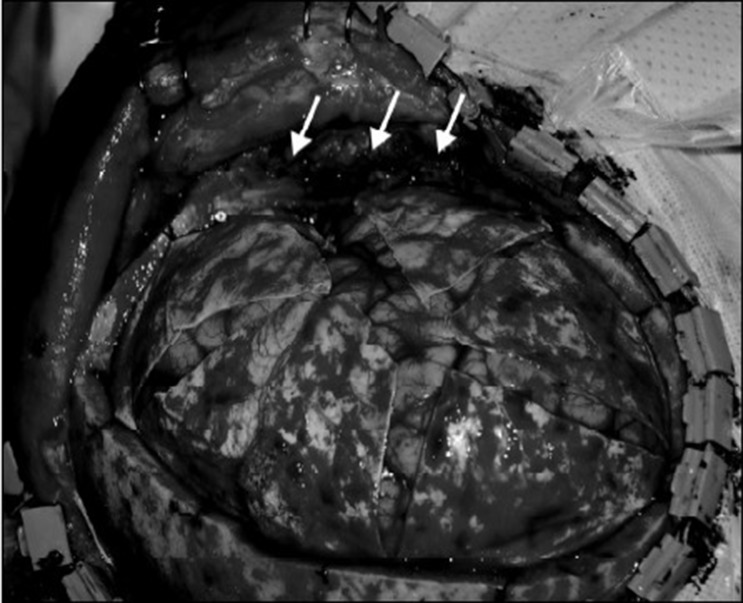J Cerebrovasc Endovasc Neurosurg.
2019 Sep;21(3):138-143. 10.7461/jcen.2019.21.3.138.
Maximum Decompressive Hemicraniectomy for Patients with Malignant Hemispheric Infarction
- Affiliations
-
- 1Department of Neurosurgery, School of Medicine, Catholic University of Daegu, Daegu, Republic of Korea.
- 2Department of Neurosurgery, School of Medicine, Kyungpook National University, Daegu, Republic of Korea. jparkmd@hotmail.com
- KMID: 2465243
- DOI: http://doi.org/10.7461/jcen.2019.21.3.138
Abstract
OBJECTIVE
The authors applied maximum external decompression for malignant hemispheric infarction and investigated the functional outcome according to the patient age.
METHODS
Twenty-five patients with malignant hemispheric infarction were treated using a hemicraniectomy with maximum external decompression, comprising a larger (>14cm) hemicraniectomy, resection of the temporalis muscle and its fascia, spaciously expansive duraplasty, and approximation of the skin flap. The medical and diagnostic imaging records for the patients were reviewed, and 1-year functional outcome data obtained for the younger group (aged ≤ 60 years) and elderly group (aged > 60 years).
RESULTS
The patients (n=25) who underwent maximum surgical decompression revealed a minimal mortality rate (n=2, 8.0%). The patients (n=14) in the younger group all survived with mRS scores of 2 (n=1, 7.1%), 3 (n=7, 50.0%), 4 (n=3, 21.4%), or 5 (n=3, 21.4%). A majority of the younger patients (57.1% with mRS ≤3) lived with functional independence. When the 1-year mRS scores were dichotomized between favorable (mRS ≤3) and unfavorable (mRS ≥4) outcomes, the younger group had significantly more patients with a favorable outcome than the elderly group (57.1% versus 9.1%, p=0.033). In contrast, in the elderly group, most patients showed unfavorable outcomes with the mRS scores of 4 (n=5, 45.5%), 5 (n=3, 27.3%), or 6 (n=2, 18.2%), whereas only one patient showed favorable outcome (mRS 3). A majority of the elderly patients (45.5% with mRS 4) survived with moderately severe disability.
CONCLUSION
For malignant hemispheric infarction, a hemicraniectomy with maximum external decompression was found to considerably increase survival with a favorable outcome in functional independence (mRS ≤3) for younger patients aged ≤60 years. It can be optimal surgical treatment for younger patients.
Keyword
MeSH Terms
Figure
Reference
-
1. Bruno A, Akinwuntan AE, Lin C, Close B, Davis K, Baute V, et al. Simplified modified rankin scale questionnaire: reproducibility over the telephone and validation with quality of life. Stroke. 2011; 8. 42(8):2276–2279. PMID: 21680905.2. Daou B, Kent AP, Montano M, Chalouhi N, Starke RM, Tjoumakaris S, et al. Decompressive hemicraniectomy: predictors of functional outcome in patients with ischemic stroke. Journal of neurosurgery. 2016; 6. 124(6):1773–1779. PMID: 26613165.
Article3. Geurts M, van der Worp HB, Kappelle LJ, Amelink GJ, Algra A, Hofmeijer J. Surgical decompression for space-occupying cerebral infarction: outcomes at 3 years in the randomized HAMLET trial. Stroke. 2013; 9. 44(9):2506–2508. PMID: 23868265.4. Gupta R, Connolly ES, Mayer S, Elkind MS. Hemicraniectomy for massive middle cerebral artery territory infarction: a systematic review. Stroke. 2004; 2. 35(2):539–543. PMID: 14707232.5. Hofmeijer J, Kappelle LJ, Algra A, Amelink GJ, van Gijn J, van der Worp HB. Surgical decompression for space-occupying cerebral infarction (the Hemicraniectomy After Middle Cerebral Artery infarction with Life-threatening Edema Trial [HAMLET]): a multicentre, open, randomised trial. The Lancet Neurology. 2009; 4. 8(4):326–333. PMID: 19269254.
Article6. Huh JS, Shin HS, Shin JJ, Kim TH, Hwang YS, Park SK. Surgical management of massive cerebral infarction. Journal of Korean Neurosurgical Society. 2007; 10. 42(4):331–336. PMID: 19096565.
Article7. Juttler E, Schwab S, Schmiedek P, Unterberg A, Hennerici M, Woitzik J, et al. Decompressive Surgery for the Treatment of Malignant Infarction of the Middle Cerebral Artery (DESTINY): a randomized, controlled trial. Stroke. 2007; 9. 38(9):2518–2525. PMID: 17690310.8. Juttler E, Unterberg A, Woitzik J, Bosel J, Amiri H, Sakowitz OW, et al. Hemicraniectomy in older patients with extensive middle-cerebral-artery stroke. The New England journal of medicine. 2014; 3. 370(12):1091–1100. PMID: 24645942.9. Park J, Goh DH, Sung JK, Hwang YH, Kang DH, Kim Y. Timely assessment of infarct volume and brain atrophy in acute hemispheric infarction for early surgical decompression: strict cutoff criteria with high specificity. Acta neurochirurgica. 2012; 1. 154(1):79–85. PMID: 21979162.
Article10. Park J, Kim E, Kim GJ, Hur YK, Guthikonda M. External decompressive craniectomy including resection of temporal muscle and fascia in malignant hemispheric infarction. Journal of neurosurgery. 2009; 1. 110(1):101–105. PMID: 18834267.
Article11. Qureshi AI, Suarez JI, Yahia AM, Mohammad Y, Uzun G, Suri MF, et al. Timing of neurologic deterioration in massive middle cerebral artery infarction: a multicenter review. Critical care medicine. 2003; 1. 31(1):272–277. PMID: 12545028.
Article12. Robertson SC, Lennarson P, Hasan DM, Traynelis VC. Clinical course and surgical management of massive cerebral infarction. Neurosurgery. 2004; 7. 55(1):55–61. discussion 61–2. PMID: 15214973.
Article13. Ropper AH, Shafran B. Brain edema after stroke. Clinical syndrome and intracranial pressure. Archives of neurology. 1984; 1. 41(1):26–29. PMID: 6606414.
- Full Text Links
- Actions
-
Cited
- CITED
-
- Close
- Share
- Similar articles
-
- Where are We Now with Decompressive Hemicraniectomy for Malignant Middle Cerebral Artery Infarction?
- The Effectiveness of Decompressive Craniectomy with Dural Augmentation in Malignant Cerebral Infarction
- Therapeutic Hypothermia after Decompressive Craniectomy in Malignant Cerebral Infarction
- Decompressive Hemicraniectomy and Duroplasty in Toddlers and Preschool Children with Refractory Intracranial Hypertension after Unilateral Hemispheric Stroke
- Surgical Management of Acute Stroke


